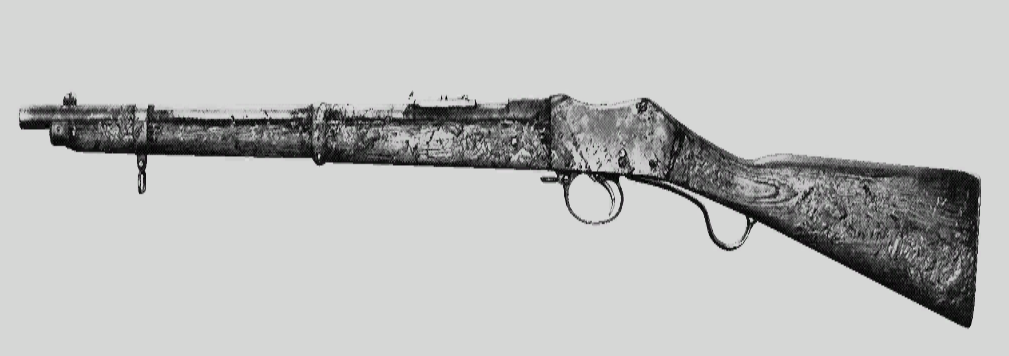Martini-Henry IC1

MARTINI-HENRY ICl. (See also, CARBINES) The Martini-Henry IC is the carbine version of the workhorse rifle of the British Empire. First adopted in 1871, it was the first to be designed from the start as a metal cartridge-fed rifle. The falling block action was first developed by American Henry O. Peabody and then finessed with an internal coil-spring striker mechanism contributed by Swiss Friedrich von Martini. Scotsman Alexander Henry lent a polygonal barrel rifling design which further enhanced accuracy. The IC1 Carbine variant, finalized in 1877, was designed from the outset to be suitable as an armament for both cavalry and artillery crews.
Recollections of Nadia Orville
Handwritten journal, 8 x 10 in.
1/5
It had been a set up. Trevors hadn't said where the case had come from, but that wasn't out the ordinary. A fresh initiate, a local boy, had worked the oars across moonlit Barataria Bay, pointing the spots where his father had taught him the Bisayan names for fish. He fell silent when I asked him where his father was now.
The oyster lugger was waiting. The captain seemed to be alone. I made him sure to see Night Terrors, to make him remember everything he'd been told about me.
The hull stank of fresh catch. He dug through the fish and pulled out a wooden case. Stamped on the side, a coat of arms.
"Martini-Henry Carbines,"he said, pulling one out. "Workhorse of the Empire, "he added, handing one to me. On deck, I checked the rifle. I asked the captain what the smell of oil was. "Cosmoline,"he answered, "to protect them on the long and...perilous sea voyage." worked the lever, and the block dropped. The hexagonal barrel was a black hole, a pit. A hand clamped round my mouth, the smell of chemicals overpowered the fish and Cosmoline. I tumbled into the black.
When I woke up, the sky was orange. The sun setting. Flashes of pain stabbed through my head. The reassuring shape of Night Terrors was out my grasp. I was lying on sand. My clothes were drenched. Not with water, I could smell, but gas
"You're awake"said the boy. He stood up from the grass. I asked him what happened. He thought long, then answered "You were drugged. They, I don't know how many, dragged us here."T looked around, a small island, one of a thousand that dotted the bay. A pyre had been built. The boy then continued "they covered us in gasoline. To burn us. But the dead attacked. Too many. Forced them back to the boat, forced them onto the water."
Lying in the sand were a few of the rifles, abandoned in the fight. "We clean those up," commanded. "They'll be back soon."
"The dead, or the men?"
"Both."
Recollections of Nadia Orville
Handwritten journal, 8 x 10 in.
2/5
I knew something wasn't right with the boy's story, but that would have to wait. We needed guns. We stripped down two of the rifles. The Cosmoline had built up a waxy residue. I bunched up my cloak and squeezed out the gas. Using a scrap of cloth and the rod, we cleaned the barrel, then brushed up the receiver and action the best we could. By the time we were finished, the sun was almost down. I realized then I was starving.
"The lugger's coming back"the boy said, looking across the water. Its light was in the distance. We reassembled the rifles. I worked the lever, the action was smooth. Pulling the trigger, the striker struck home with a smooth click. The catch on the side flicked too. It seemed to be in working order, though there was no way to know for sure. I dropped a cartridge into the block, and worked it home. We only had a handful.
The lugger pulled into earshot of the island, its light reflecting the glossy surface of the water.
"Nadia, you proved yourself as capable as I expected"a voice called out. It wasn't the captain, but someone else. I didn't recognize the accent. Someone not from here. But familiar.
"What do you want with us?"I replied, sighting the length of the rifle. I couldn't make out a clear silhouette on the boat
"To send a message. To Isaac. That's all I've ever wanted with you."I wondered, was the man from the North? New England? His voice sounded like it came from money.
"Tell me now, and I'll think on if it's worth passing on."I shouted back. A match sparked from beyond the searchlight. I squared the sights on it.
"You fire that, you'll go up like a match."The man called back. The way he said match. The syllable "atch."A memory took hold. Flooded my senses. My mother. A British soldier, talking, saying "watch."
I squeezed the trigger, the world burst into flames.
